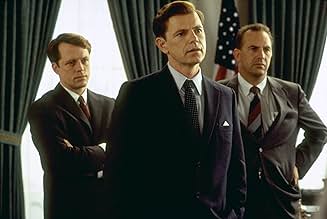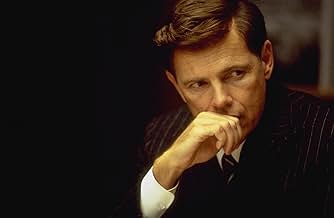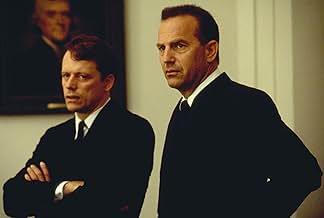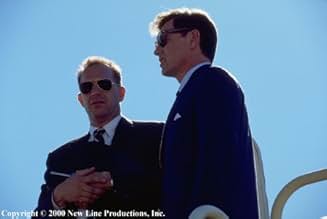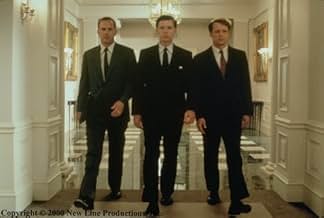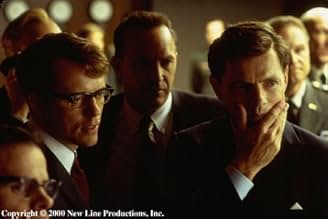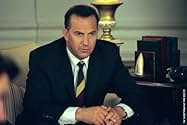VALUTAZIONE IMDb
7,3/10
64.993
LA TUA VALUTAZIONE
Nell'ottobre 1962, l'amministrazione Kennedy lotta per contenere la crisi missilistica cubana.Nell'ottobre 1962, l'amministrazione Kennedy lotta per contenere la crisi missilistica cubana.Nell'ottobre 1962, l'amministrazione Kennedy lotta per contenere la crisi missilistica cubana.
- Regia
- Sceneggiatura
- Star
- Premi
- 3 vittorie e 8 candidature totali
Recensioni in evidenza
Shown through the eyes of presidential aide Kenneth P. O'Donnell (Kevin Costner), we see the inner workings of President John F. Kennedy (Bruce Greenwood) and his closest advisors as they try and find the best way to end a potentially devastating showdown with the U.S.S.R. In October of 1962, the U.S., during a regular mission photographing Cuba, spotted a missile buildup by the Russians. The missiles were powerful enough to kill 80 million Americans with only 5 minutes of warning time. President Kennedy had to decide quickly what action to take. With his trusted aide Kenny O'Donnell and his brother Attorney General Robert F. Kennedy (Steven Culp), and others such as Robert McNamara, Adlai Stevenson, McGeorge Bundy, Dean Acheson, Dean Rusk, and many more, Kennedy needed to figure out the best course of action. If he allowed the Russians to aim these missiles at the U.S., the United States would be placed in a potentially deadly situation. If Kennedy allowed the military to attack the missiles and destroy them, what would Russia do as a response? If he waited too long, would Russia simply attack the U.S.? If he backed down and agreed to take down U.S. missiles in Turkey, would the U.S. then look weak to the rest of the world? For such a young President, Kennedy had a lot of tough decisions to make, in a short amount of time, with the world hanging in the balance.
I wasn't alive during the Cuban Missile Crisis as it occurred, so seeing Thirteen Days was like having a history lesson at the same time as having great entertainment. Even though I knew that we didn't end up in World War III, there were a lot of things I didn't know. I won't go into any of the specifics, but I never fully understood how close we came to destroying the planet. The tensions of the time were brought out successfully by director Roger Donaldson. You could see and feel the sweat on all the major players as each minute ticked by. Bruce Greenwood did a tremendous job as the young President Kennedy, showing how Kennedy was strong enough to stand by his morals and values, even as his most trusted advisors were urging him to go to war. At the same time, Greenwood was able to portray Kennedy as someone who needed help and was able to turn to his brother for guidance. Kevin Costner did a good job as Kennedy's presidential aide. I especially liked his boston accent. Costner was a strong personality that worked well with Greenwood and Steven Culp. I believed that the three of them were friends for 15 years and that they trusted each other with their own lives. Other acting standouts to me were Dylan Baker as Robert McNamara and Michael Fairman as Adlai Stevenson.
Even running at almost two and a half hours, I was always at the edge of my seat, wondering what was going to happen next. Like I said before, I wasn't even born yet, nor was it something I ever learned about in school, so I had no idea what was going to happen. It was nice being able to get deep inside the mind of these important people during this crucial time. Of course, I have no idea if what was said during these meetings was actually said in real life, but I'd like to believe that at least the outcomes of the meetings were true. I'm a big fan of these kinds of dramatic films based on real life events. While being entertaining, they also have the ability to teach you about history. Reading about these situations in books isn't nearly as enjoyable as being able to watch them on screen. I think screenwriter David Self did a great job of bringing these real life events to life on the big screen. He made it historical but didn't bore you with too much talk or information. Along with Donaldson, he gave you what you needed to know, and let the actors bring you into the action.
So overall, I thought Thirteen Days was a great film. Well acted, well directed, well written, nice musical score and very entertaining throughout. And if you happen to learn something along the way like I did, then even better.
I wasn't alive during the Cuban Missile Crisis as it occurred, so seeing Thirteen Days was like having a history lesson at the same time as having great entertainment. Even though I knew that we didn't end up in World War III, there were a lot of things I didn't know. I won't go into any of the specifics, but I never fully understood how close we came to destroying the planet. The tensions of the time were brought out successfully by director Roger Donaldson. You could see and feel the sweat on all the major players as each minute ticked by. Bruce Greenwood did a tremendous job as the young President Kennedy, showing how Kennedy was strong enough to stand by his morals and values, even as his most trusted advisors were urging him to go to war. At the same time, Greenwood was able to portray Kennedy as someone who needed help and was able to turn to his brother for guidance. Kevin Costner did a good job as Kennedy's presidential aide. I especially liked his boston accent. Costner was a strong personality that worked well with Greenwood and Steven Culp. I believed that the three of them were friends for 15 years and that they trusted each other with their own lives. Other acting standouts to me were Dylan Baker as Robert McNamara and Michael Fairman as Adlai Stevenson.
Even running at almost two and a half hours, I was always at the edge of my seat, wondering what was going to happen next. Like I said before, I wasn't even born yet, nor was it something I ever learned about in school, so I had no idea what was going to happen. It was nice being able to get deep inside the mind of these important people during this crucial time. Of course, I have no idea if what was said during these meetings was actually said in real life, but I'd like to believe that at least the outcomes of the meetings were true. I'm a big fan of these kinds of dramatic films based on real life events. While being entertaining, they also have the ability to teach you about history. Reading about these situations in books isn't nearly as enjoyable as being able to watch them on screen. I think screenwriter David Self did a great job of bringing these real life events to life on the big screen. He made it historical but didn't bore you with too much talk or information. Along with Donaldson, he gave you what you needed to know, and let the actors bring you into the action.
So overall, I thought Thirteen Days was a great film. Well acted, well directed, well written, nice musical score and very entertaining throughout. And if you happen to learn something along the way like I did, then even better.
The 1962 Cuban Missile Crisis seen through the eyes of President assistant Kenny O'Donnell (Kevin Costner who hands perfectly the role )as trusted confidante and with significance importance of Robert Kennedy ( Steven Culp who bears remarkable resemblance )and of course President John F . Kennedy ( a solid Bruce Greenwood ) . This interesting film widely develops the Cuban Missile Crisis that was a confrontation between the Soviet Union, Cuba and the United States in October 1962, during the Cold War. The picture is packed with suspense , drama , historical deeds and is quite entertaining . It's correctly based on facts and the few sacrifices of accuracy are realized in the sense of of dramatic license . The motion picture is very well directed by Roger Donaldson who formerly worked with Costner in another suspenseful movie and also plenty of political intrigue titled ¨No way out (87) ¨ .
Adding more details over the widely depicted on the movie the events happened of the following manner : In September 1962, the Cuban and Soviet governments began to surreptitiously build bases in Cuba for a number of medium- and intermediate-range ballistic nuclear missiles (MRBMs and IRBMs) with the ability to strike most of the continental United States. This action was subsequent to the 1958 deployment of Thor IRBMs in the UK and Jupiter IRBMs to Italy and Turkey in 1961; more than 100 U.S.-built missiles having the capability to strike Moscow with nuclear warheads. On October 14, 1962, a United States U-2 photo-reconnaissance plane captured photographic proof of Soviet missile bases under construction in Cuba.The ensuing crisis ranks with the Berlin Blockade as one of the major confrontations of the Cold War and is generally regarded as the moment in which the Cold War came closest to turning into a nuclear conflict .The US President ( Bruce Greenwood) , Attorney General Robert Kennedy (Steven Culp ),State Secretary Robert McNamara ( Dylan Baker ) and his military staff ( Bill Smitrovich , Ed Lauter , James Karen , Len Cariou) and general Curtis LeMay (Kevin Conway ) considered attacking Cuba via air and sea and settled on a "quarantine" of Cuba. The U.S. announced that it would not permit offensive weapons to be delivered to Cuba and demanded that the Soviets dismantle the missile bases already under construction or completed in Cuba and remove all offensive weapons. The Kennedy administration held a slim hope that the Kremlin would agree to their demands, and expected a military confrontation. On the Soviet end, Nikita Khrushchev wrote Kennedy that his quarantine of "navigation in international waters and air space to constitute an act of aggression propelling humankind into the abyss of a world nuclear-missile war." Fidel Castro encouraged Khrushchev to launch a preemptive first-strike nuclear attack on the U.S. The Soviets publicly balked at the U.S. demands, but in secret back-channel communications initiated a proposal to resolve the crisis. The confrontation ended on October 28, 1962 when President John F. Kennedy and United Nations Secretary-General U Thant reached an agreement with Soviet Premier Nikita Khrushchev to dismantle the offensive weapons and return them to the Soviet Union, subject to United Nations verification, in exchange for an agreement by the United States to never invade Cuba. The Soviets removed the missile systems and their support equipment, loading them onto eight Soviet ships from November 5–9. A month later, on December 5 and 6, the Soviet IL-28 bombers were loaded onto three Soviet ships and shipped back to Russia. The quarantine was formally ended previously on November 20, 1962. As a secret part of the agreement, all US-built Thor and Jupiter IRBMs deployed in Europe were deactivated by September 1963.The Cuban Missile Crisis spurred the creation of the Hotline Agreement and the Moscow-Washington hot line, a direct communications link between Moscow and Washington .
Adding more details over the widely depicted on the movie the events happened of the following manner : In September 1962, the Cuban and Soviet governments began to surreptitiously build bases in Cuba for a number of medium- and intermediate-range ballistic nuclear missiles (MRBMs and IRBMs) with the ability to strike most of the continental United States. This action was subsequent to the 1958 deployment of Thor IRBMs in the UK and Jupiter IRBMs to Italy and Turkey in 1961; more than 100 U.S.-built missiles having the capability to strike Moscow with nuclear warheads. On October 14, 1962, a United States U-2 photo-reconnaissance plane captured photographic proof of Soviet missile bases under construction in Cuba.The ensuing crisis ranks with the Berlin Blockade as one of the major confrontations of the Cold War and is generally regarded as the moment in which the Cold War came closest to turning into a nuclear conflict .The US President ( Bruce Greenwood) , Attorney General Robert Kennedy (Steven Culp ),State Secretary Robert McNamara ( Dylan Baker ) and his military staff ( Bill Smitrovich , Ed Lauter , James Karen , Len Cariou) and general Curtis LeMay (Kevin Conway ) considered attacking Cuba via air and sea and settled on a "quarantine" of Cuba. The U.S. announced that it would not permit offensive weapons to be delivered to Cuba and demanded that the Soviets dismantle the missile bases already under construction or completed in Cuba and remove all offensive weapons. The Kennedy administration held a slim hope that the Kremlin would agree to their demands, and expected a military confrontation. On the Soviet end, Nikita Khrushchev wrote Kennedy that his quarantine of "navigation in international waters and air space to constitute an act of aggression propelling humankind into the abyss of a world nuclear-missile war." Fidel Castro encouraged Khrushchev to launch a preemptive first-strike nuclear attack on the U.S. The Soviets publicly balked at the U.S. demands, but in secret back-channel communications initiated a proposal to resolve the crisis. The confrontation ended on October 28, 1962 when President John F. Kennedy and United Nations Secretary-General U Thant reached an agreement with Soviet Premier Nikita Khrushchev to dismantle the offensive weapons and return them to the Soviet Union, subject to United Nations verification, in exchange for an agreement by the United States to never invade Cuba. The Soviets removed the missile systems and their support equipment, loading them onto eight Soviet ships from November 5–9. A month later, on December 5 and 6, the Soviet IL-28 bombers were loaded onto three Soviet ships and shipped back to Russia. The quarantine was formally ended previously on November 20, 1962. As a secret part of the agreement, all US-built Thor and Jupiter IRBMs deployed in Europe were deactivated by September 1963.The Cuban Missile Crisis spurred the creation of the Hotline Agreement and the Moscow-Washington hot line, a direct communications link between Moscow and Washington .
I served aboard the USS Joseph P. Kennedy which was depicted in the film. The Kennedy was the ship that boarded the Marcula in the waters off the Bahamas. The Kennedy, now part of Battleship cove in Fall River, Ma., actually played herself in the film. The actual boarding was not as quite dramatic as depicted in the movie.
The boarding party for instance did not wear dress white uniforms and the Marcula was more of a "rust bucket" than depicted in the movie. Although the 5 inch guns were aimed at the vessel, I don't recall a shot being fired.
As far as the movie is concerned I though it gave a rather accurate accounting of the circumstances that surrounded this time in history with a few embellishment's that are purely thrown in as theatrical license.
The boarding party for instance did not wear dress white uniforms and the Marcula was more of a "rust bucket" than depicted in the movie. Although the 5 inch guns were aimed at the vessel, I don't recall a shot being fired.
As far as the movie is concerned I though it gave a rather accurate accounting of the circumstances that surrounded this time in history with a few embellishment's that are purely thrown in as theatrical license.
I watched this movie today with a number of students from my International Politics class, and from the standpoint of a politics professor, this film was absolutely extraordinary. This is a movie about the development of foreign policy in a crisis; it spells out with brilliant detail the decision-making process of JFK's inner circle, the tension between the Executive Office of the President and the Departments of State and Defense, and the attempts by the Military Industrial Complex (namely the Joint Chiefs) to undermine the diplomatic approaches favored by the president. It highlights the conflict between military standard operating procedures ("rules of engagement") and the better judgment/common sense of right-thinking human beings. It hints at conspiracies to (later) depose and otherwise get rid of both Kennedy and Khruschev from within for what turned out to be a very unpopular resolution with the hardliners on both sides. I especially like that the movie acknowledged the humanity of the individual decision-makers without getting too Capra-esquire or preachy.
I can see why this film hasn't been a great commercial success. It is not your standard big studio fare. It's quite cerebral, and although it has some exciting pre-conflict scenes, it's not a "war film". (It reminds me a bit of "Three Kings" in that regard- both films were, in my opinion, mis-marketed. They both seemed to target the younger male action crowd, when both movies are really made for a more intellectual audience.) I liked how the Soviets were not cartoonishly vilified, as is common in a lot of Cold War era films. They were shown to be somewhat calculating and strategic, but not irrational or more importantly, inhuman. In fact, one of the most fascinating parts of the film is the revelation that both sides lack information as to the other side's true intentions. It was this uncertainty that back in October 1962, could have led to the end of civilization as we know it.
The acting was solid (Steven Culp was very, very good as Robert Kennedy- so good, in fact, that I'm afraid he'll have a hard time getting cast in the future. There was audible gasp in the audience when he came on the screen and WAS Bobby). Coaster's accent was actually annoying (as an earlier reviewer noted), but it's forgivable in light of the moving, somewhat understated performance he turns in. It is the directing that takes the cake, however. From the moment the chain of events was set in motion, the tension does NOT let up. It actually feels like you are back in 1962 living through the events of those two weeks- honestly, there was nary a moment to relax until the resolution was wrought. I recommend this film especially strongly to high school and college age students who are too young to have any Cold War memory, as well as to those who lived through the era and may have forgotten what it felt like to come this close.
I can see why this film hasn't been a great commercial success. It is not your standard big studio fare. It's quite cerebral, and although it has some exciting pre-conflict scenes, it's not a "war film". (It reminds me a bit of "Three Kings" in that regard- both films were, in my opinion, mis-marketed. They both seemed to target the younger male action crowd, when both movies are really made for a more intellectual audience.) I liked how the Soviets were not cartoonishly vilified, as is common in a lot of Cold War era films. They were shown to be somewhat calculating and strategic, but not irrational or more importantly, inhuman. In fact, one of the most fascinating parts of the film is the revelation that both sides lack information as to the other side's true intentions. It was this uncertainty that back in October 1962, could have led to the end of civilization as we know it.
The acting was solid (Steven Culp was very, very good as Robert Kennedy- so good, in fact, that I'm afraid he'll have a hard time getting cast in the future. There was audible gasp in the audience when he came on the screen and WAS Bobby). Coaster's accent was actually annoying (as an earlier reviewer noted), but it's forgivable in light of the moving, somewhat understated performance he turns in. It is the directing that takes the cake, however. From the moment the chain of events was set in motion, the tension does NOT let up. It actually feels like you are back in 1962 living through the events of those two weeks- honestly, there was nary a moment to relax until the resolution was wrought. I recommend this film especially strongly to high school and college age students who are too young to have any Cold War memory, as well as to those who lived through the era and may have forgotten what it felt like to come this close.
Basically this movie is a great history lesson. If you want to know more about the cold war and the Cuba missile crisis in particular this is a perfect medium for you to start with. The movie is quite detailed and accurate even though of course some moments and characters have been 'over-dramatized' for the good of the movie and its flow and emotions.
Even though you already know from start till finish how this movie is going to end, it still is a tense movie to watch. The story is build up well and makes the movie really interesting and compelling to follow. It perfectly captures the tension of the whole crisis and really makes you realize how close the world actually came to a WW III. It makes us aware of the fact that those 13 days in history should always be remembered and used as a lesson for the entire world now and forever. It's too bad that the movie becomes a bit too moralistic at times, especially toward the ending.
Bruce Greenwood doesn't really look like JFK but he's a good actor, so he becomes believable enough in his role trough his acting skills. Steven Culp really does look like Robert Kennedy and on top of that he also is a great actor. I wasn't always happy with Kevin Costner performance but overall he did an acceptable job. There are some weaker moments which involves his character but I more blame those moments to the at times too moralistic written script.
A bit of a disappointing aspect of the whole movie is its style. Roger Donaldson at times tries to be over-artistic and mixes the movie with black & white and color images. Perhaps he tried to copy Oliver Stone's style? Who knows. The cinematography was also disappointingly standard but thankfully the good editing saved this a little. Also the musical score by Trevor Jones is surprisingly solid.
Overall it's a very good political movie that has some great tense and important moments in it and also works great as a history lesson.
8/10
http://bobafett1138.blogspot.com/
Even though you already know from start till finish how this movie is going to end, it still is a tense movie to watch. The story is build up well and makes the movie really interesting and compelling to follow. It perfectly captures the tension of the whole crisis and really makes you realize how close the world actually came to a WW III. It makes us aware of the fact that those 13 days in history should always be remembered and used as a lesson for the entire world now and forever. It's too bad that the movie becomes a bit too moralistic at times, especially toward the ending.
Bruce Greenwood doesn't really look like JFK but he's a good actor, so he becomes believable enough in his role trough his acting skills. Steven Culp really does look like Robert Kennedy and on top of that he also is a great actor. I wasn't always happy with Kevin Costner performance but overall he did an acceptable job. There are some weaker moments which involves his character but I more blame those moments to the at times too moralistic written script.
A bit of a disappointing aspect of the whole movie is its style. Roger Donaldson at times tries to be over-artistic and mixes the movie with black & white and color images. Perhaps he tried to copy Oliver Stone's style? Who knows. The cinematography was also disappointingly standard but thankfully the good editing saved this a little. Also the musical score by Trevor Jones is surprisingly solid.
Overall it's a very good political movie that has some great tense and important moments in it and also works great as a history lesson.
8/10
http://bobafett1138.blogspot.com/
Lo sapevi?
- QuizPresident John F. Kennedy very frequently set up recording machines during meetings at the White House. Much of the dialogue from the movie is taken directly from Kennedy's tapes.
- BlooperPresident Kennedy wanted an eyewitness account so badly that Commander Ecker was ordered to the Pentagon to brief the Joint Chiefs of Staff immediately after landing his RF-8A Crusader, sweaty flight suit and all. This is often thought to be a glaring error in the movie, but his attire is absolutely accurate. Cdr. Ecker was not even allowed to exit his Crusader when he landed at NAS Cecil Field, Jacksonville FL. His film canisters were unloaded from his aircraft, he was refueled and sent immediately to Washington D.C., landing at Andrews AFB and whisked by limousine directly to the Pentagon where he met with the Joint Chiefs of Staff, apologizing right away for appearing at the briefing in his sweat-soaked flight suit. Cdr. Ecker, parched from the Cuba overflight and then the flight north to Washington, asked in a hoarse voice for a drink of water when he arrived. He refuses it in the movie.
- Citazioni
Kenny O'Donnell: If the sun comes up tomorrow, it is only because of men of good will. And that's - that's all there is between us and the devil.
- ConnessioniEdited from Trinity and Beyond: The Atomic Bomb Movie (1995)
I più visti
Accedi per valutare e creare un elenco di titoli salvati per ottenere consigli personalizzati
Dettagli
- Data di uscita
- Paese di origine
- Lingue
- Celebre anche come
- Trece días
- Luoghi delle riprese
- Aziende produttrici
- Vedi altri crediti dell’azienda su IMDbPro
Botteghino
- Budget
- 80.000.000 USD (previsto)
- Lordo Stati Uniti e Canada
- 34.592.089 USD
- Fine settimana di apertura Stati Uniti e Canada
- 46.668 USD
- 25 dic 2000
- Lordo in tutto il mondo
- 66.579.890 USD
- Tempo di esecuzione2 ore 25 minuti
- Colore
- Mix di suoni
- Proporzioni
- 1.85 : 1
Contribuisci a questa pagina
Suggerisci una modifica o aggiungi i contenuti mancanti

Divario superiore
What was the official certification given to Thirteen Days (2000) in Mexico?
Rispondi






